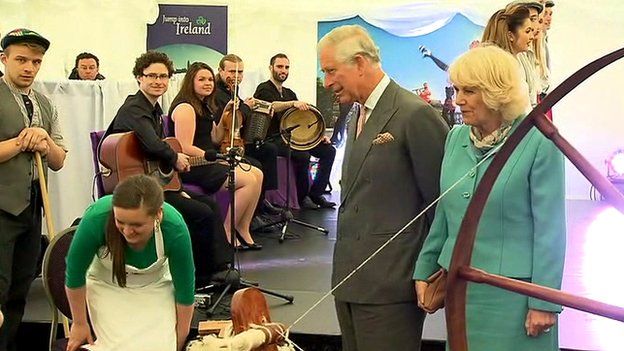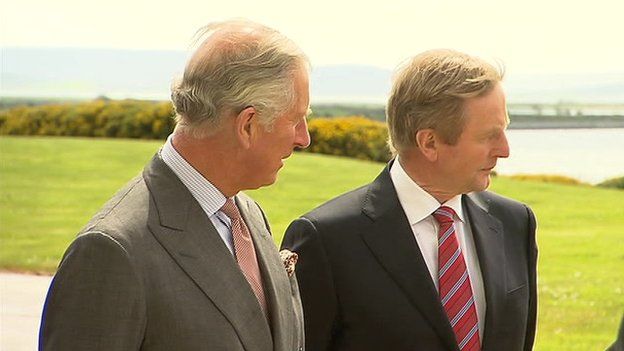Prince Charles meets Sinn Féin leader Gerry Adams
- 19 May 2015
- Northern Ireland
Prince Charles has met Sinn Féin leader Gerry Adams at the start of his four-day visit to Ireland.
Mr Adams was among a number of politicians to greet the prince at a reception at National University of Ireland Galway.
It was the first meeting in the Republic of Ireland between Sinn Féin's leadership and a Royal Family member.
Mr Adams and his colleague Martin McGuinness also had a private meeting with Prince Charles.
'Common mind''
That meeting took place after the handshake and was in a private room. It lasted between 15 and 20 minutes.
Afterwards, Mr Adams said: "We did discuss the need for the entire process to move forward, particularly in regard to those who have suffered, those who have been bereaved."
He added: "Both he and we expressed our regret for what happened from 1968 onwards.
"We were of a common mind and the fact that the meeting took place, it obviously was a big thing for him to do and a big thing for us to do."
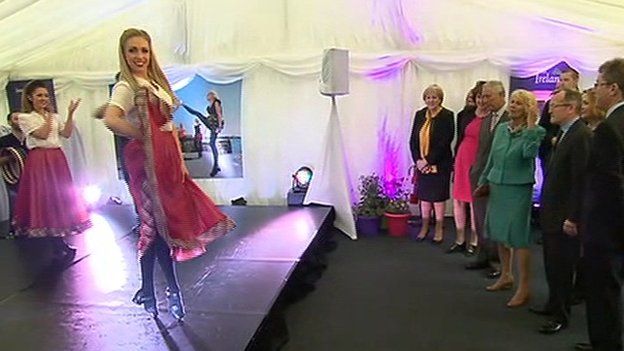
However, not everyone welcomed the meeting and the prince's visit.
As Mr Adams was meeting Prince Charles, one of his party's MP's, Paul Maskey, was attending a protest over Parachute Regiment shootings in the Ballymurphy area of west Belfast in the early 1970s.
"Sinn Féin have long supported the Ballymurphy families and will continue to do so," Mr Maskey said.
"Gerry Adams, Martin McGuinness and other Sinn Féin representatives met today with Prince Charles. This is part of a larger process of peace and reconciliation and moving society forward."
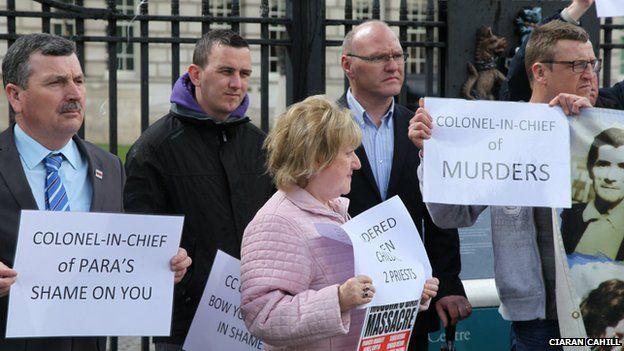
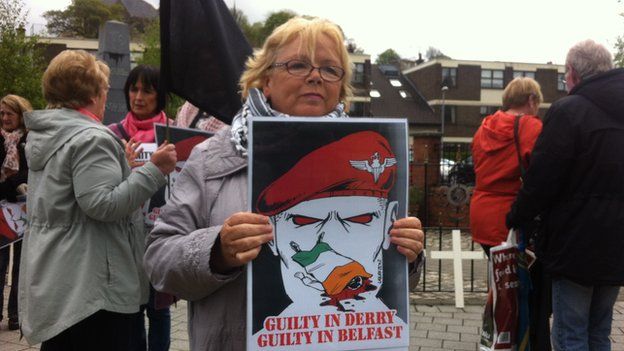
A protest involving about 40 people was held in Londonderry opposing the visit. It included some relatives of those who were killed by paratroops on Bloody Sunday.
John Teggart's father, Danny, was one of 10 people killed by soldiers in Ballymurphy, west Belfast, in 1971.
"Prince Charles represents the Parachute Regiment who, for many years, murdered innocent civilians in Belfast, including my father," he said.
"I am totally opposed to him coming to Belfast and to the north in general."
Victims campaigner Alan McBride, whose wife Sharon was killed in the IRA Shankill Road bombing in 1993, said the families of some of the victims would find the handshake difficult to watch.
"At the end of the day, it is just a handshake and I long for the day when these things don't have the sort of significance that they have at present, because of our history and the conflict and all of that," he said.
"But we're not there yet, and particularly for families that lost people, these can be very emotional and traumatic days."
Mr McBride said he had heard interviews with some of the Ballymurphy families that he felt illustrated "a lot of hurt there, just underneath the surface".
'Extraordinary kindness'
In a speech at the university, Prince Charles paid tribute to the "magic about Ireland that is totally unique".
"Having first had the great joy of coming to Ireland 20 years ago now, for the first time in 1995, then again in 2002, each time I have been so overwhelmed and so deeply touched by the extraordinary kindness, the welcome, the enthusiasm and indeed the fun of being in Ireland," the prince said.
He said of the Irish people: "You raise our spirits in so many ways."
He also joked that he was "a little too old to be able to learn some of the steps from the Irish dancing routine" performed for the Royal couple after their arrival.
Following the visit to the university, Prince Charles visited Galway's Marine Institute and the Burren area of County Clare, while Camilla attended a number of events in Galway city centre.
The couple are to attend a private dinner with Irish President Michael D Higgins and his wife Sabina at Lough Cutra in County Galway on Tuesday night.
Prince Charles, who is a pioneer in organic and sustainable farming, visited the farm of Patrick Nagle near Corofin in the Burren. He also met Brendan Dunford of the Burren Life project, which has helped farmers to work successfully in the unique landscape.
He met members of the Burren Beo Trust, which has been spearheading an educational project about the Burren in schools for the past decade.
The Duchess of Cornwall visited the Druid Theatre in Galway, watching a short performance of the opening scene of "Richard II".
Historic handshake
In 2012, Sinn Féin's deputy leader Martin McGuinness met the Queen in Belfast in his role as Northern Ireland's deputy first minister.
The handshake between the Queen and the former IRA commander, at the Lyric Theatre in Belfast, was considered historic.
However, he was not the first party member to meet British royalty.
In May 2011, Michael Browne, the Sinn Féin mayor of Cashel shook hands with the Queen in County Tipperary.
The meeting had not been approved by the Sinn Féin leadership.
During his own trip Charles, joined by the Duchess of Cornwall, will visit the village of Mullaghmore in County Sligo - where his great-uncle, Earl Mountbatten, was killed by an IRA bomb in 1979.

Analysis: Peter Hunt, royal correspondent
A handshake - an everyday action for so many of us - is invested with so much more when it's in the context of the evolving and improving relationship between Britain and Ireland.
This one was once unthinkable. It lasted some 12 seconds.
The heir to the throne was carrying that most English of things - a cup of tea. Gerry Adams was furnished with a firm and lingering grasp.
After the show of togetherness for public consumption, there followed an equally significant, but unrecorded, private meeting.
After his political contribution, Prince Charles will make a personal journey to Mullaghmore where his godfather and confidant Lord Mountbatten was murdered by the IRA.
That will be on Wednesday. Today, Prince Charles has, in the words of a speech on Ireland he once delivered, become a subject of the two countries' shared history and not its prisoner.

